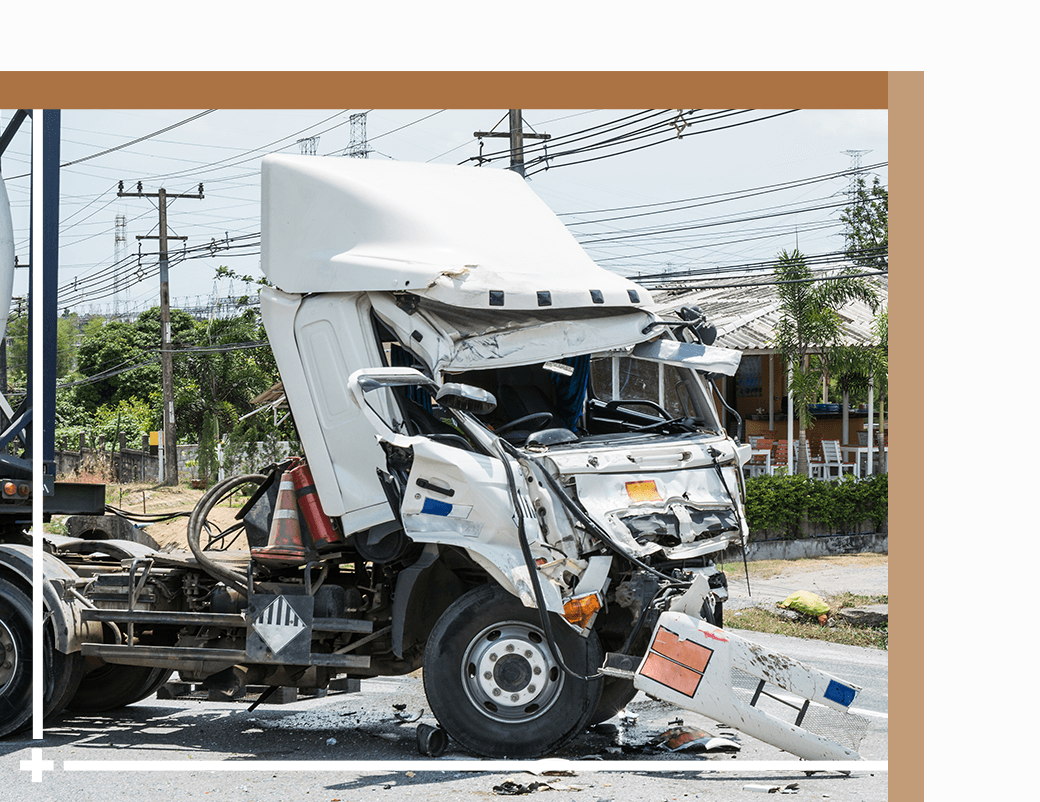Protecting the Rights of Injured Clients

North Carolina Truck Accident Attorneys
Attorneys Serving North Carolina Since 1999
At Hyland, Padilla & Fowler, PLLC, our North Carolina truck accident attorneys have helped many of our clients recover compensation for their claims. With more than 50 years of combined experience, we have extensive knowledge of state laws and courts to help you navigate through the potential complexities of your case.
The attorneys at Hyland, Padilla & Fowler, PLLC are here to help you maximize your potential recovery*
Understanding Possible Tractor Trailer Accident Laws=
A truck accident refers to any collision or incident involving a large motor vehicle commonly known as a truck. These accidents can occur for various reasons, including human error, mechanical failure, adverse weather conditions, or a combination of factors.
In general, a fully loaded tractor-trailer can weigh as much as 80,000 pounds, while most passenger vehicles only weigh around 3,000 pounds. This weight disparity often results in serious and even fatal accidents.
Common types of truck accidents include:
- Rear-end collisions: When a truck collides with the vehicle in front of it. This can happen if the truck driver is following too closely or if they fail to brake in time.
- Jackknife accidents: This occurs when the trailer of a truck swings outward, forming an L or V shape with the cab. Jackknifing can happen if the truck driver brakes suddenly or loses control.
- Underride accidents: These accidents happen when a smaller vehicle slides under the rear or side of a truck. Underride guards are mandated to reduce the risk of these accidents.
- Override accidents: This occurs when a truck runs over a smaller vehicle, often due to the truck driver's inability to stop in time or maintain control.
- Rollover accidents: Trucks have a higher risk of rolling over due to their size and center of gravity. Rollovers can happen when a truck takes a turn too quickly or encounters uneven terrain.
- Blind spot accidents: Trucks have large blind spots, and accidents can occur when smaller vehicles linger in these areas and are not visible to the truck driver.
- Tire blowouts: When a truck's tire suddenly bursts, it can lead to loss of control and result in an accident.
- Wide-turn accidents: Trucks require more space to make turns, and accidents can happen when other vehicles attempt to pass a turning truck or are too close during a turn.
- Cargo spills: Improperly secured or overloaded cargo can lead to spills, potentially causing accidents and road hazards.
Federal Trucking Regulations
Federal trucking laws are regulations established by various agencies within the United States government to ensure the safe and efficient operation of commercial motor vehicles (CMVs), including trucks and buses. The primary agency responsible for regulating the trucking industry at the federal level is the Federal Motor Carrier Safety Administration (FMCSA), which operates under the U.S. Department of Transportation.
Here are some key aspects of federal trucking laws:
- Hours of Service (HOS): The HOS regulations dictate the maximum amount of time that a truck driver can spend driving and the required rest periods. These rules are designed to prevent driver fatigue, enhance safety, and reduce the risk of accidents caused by drowsy driving.
- Electronic Logging Devices (ELDs): ELDs are electronic devices that record a driver's driving hours and other relevant data, replacing traditional paper logbooks. The use of ELDs is mandated by federal law to improve accuracy in tracking and enforcing HOS regulations.
- Commercial Driver's License (CDL): Federal regulations set standards for obtaining and maintaining a CDL. The requirements include written tests, skills tests, and medical examinations. Different classes of CDLs are available for various types of commercial vehicles.
- Vehicle Maintenance and Inspection: Regulations outline requirements for the regular inspection, maintenance, and repair of commercial vehicles. Proper maintenance is crucial for preventing accidents caused by mechanical failures.
- Weight Limits: Federal law establishes maximum weight limits for commercial vehicles, including both gross vehicle weight and axle weight limits. States may have their own specific regulations in addition to federal standards.
- Hazmat Transportation: The transportation of hazardous materials is subject to specific federal regulations to ensure the safety of both the driver and the public. These regulations cover proper labeling, packaging, and handling of hazardous materials.
- Drug and Alcohol Testing: Federal law requires mandatory drug and alcohol testing for commercial drivers. Employers must have programs in place to test drivers for controlled substances and alcohol use.
- Insurance Requirements: Trucking companies are required to maintain a minimum level of insurance coverage to cover potential liabilities in the event of an accident.
- Driver Qualifications: Federal regulations establish standards for the qualifications and responsibilities of commercial drivers. This includes age restrictions, language proficiency, and health requirements.
- Registration and Licensing: Trucks engaged in interstate commerce must comply with federal registration requirements. Additionally, the FMCSA issues operating authority, known as the Motor Carrier (MC) number, to interstate carriers.
Determining Liability in a Truck Accident
Determining liability in a truck accident can be complex, as multiple parties may be involved, and factors such as negligence, regulatory compliance, and contractual relationships come into play.
The following are potential parties that can be held liable in a truck accident:
- Truck Driver: The primary responsibility often falls on the truck driver. If the accident was caused by the driver's negligence, such as speeding, distracted driving, or driving under the influence, they may be held personally liable.
- Trucking Company: The trucking company that owns or operates the truck can be held liable for the actions of their drivers. This includes cases where the company may have been negligent in hiring, training, or supervising the driver. If the accident is a result of equipment failure due to inadequate maintenance, the company could also be held responsible.
- Truck Owner: In some cases, the truck and trailer may be owned by different entities. If the owner of the truck or trailer is different from the trucking company, they may share liability, depending on the circumstances.
- Maintenance and Repair Contractors: If the accident is caused by a mechanical failure due to inadequate maintenance or repairs, the party responsible for maintaining or repairing the truck may be held liable.
- Cargo Loaders: If the accident is caused by improperly loaded or secured cargo, the individuals or companies responsible for loading the cargo may be held liable.
- Manufacturers of Defective Parts: If the accident is a result of a defective truck part, such as faulty brakes or tires, the manufacturer of that part may be held liable.
- Government Entities: If poor road conditions, inadequate signage, or other issues related to road maintenance played a role in the accident, a government entity responsible for maintaining the road may be held liable.
- Third-Party Contractors: In some cases, the trucking company may hire third-party contractors for specific tasks, such as maintenance or cargo loading. If the actions of these contractors contribute to the accident, they may share liability.
How We Can Help
The main legal basis for seeking compensation in a tractor trailer accident is negligence. In order to prove a driver’s negligence, the plaintiff must show that the driver failed to exercise a reasonable duty of care, which caused the plaintiff’s injuries. At Hyland, Padilla & Fowler, PLLC, our truck accident lawyers can investigate the incident and talk with you to determine the best course of action for pursuing compensation.
Damages You May Be Entitled to Include:
- Medical Expenses
- Damages for Permanent Injuries
- Pain and Suffering
- Loss of Earnings
The North Carolina truck accident lawyers at Hyland, Padilla & Fowler, PLLC can look at photos of the accident, talk to witnesses, and examine police reports to determine whose negligence caused the accident. We offer bilingual legal services to answer your questions, and we are prepared to represent you against insurance companies in court if necessary.
Want To Discuss Your Situation With Our Attorneys?

Our Results
Experienced Legal Help from Hyland, Padilla & Fowler Since 1999
-
Over 7000 Cases Handled We have represented thousands of personal injury clients since 1999.

-
“Llegué a Hyland, Padilla & Fowler, PLLC después de un accidente automovilístico. El Sr. Padilla trabajó muy duro en mi caso. Su principal preocupación es el bienestar de sus clientes. Fue cariñoso, profesional,” - Toni B.
-
“Muy contenta y genial con los resultados. Gracias por ayudar a la comunidad hispana muy feliz con los resultados bendiciones. Andrea y Stefani hicieron un gran trabajo.” - Jazmin B.



.2304041030550.jpg)











